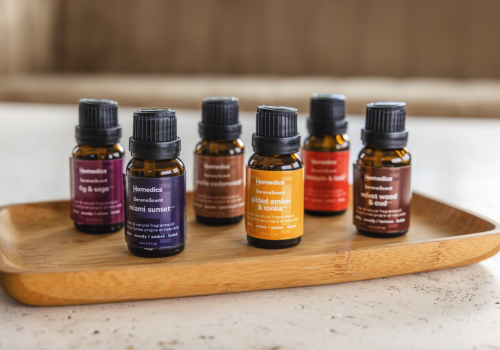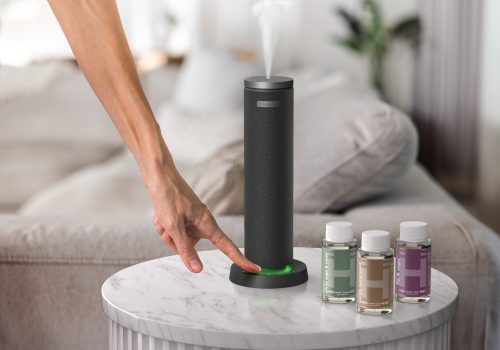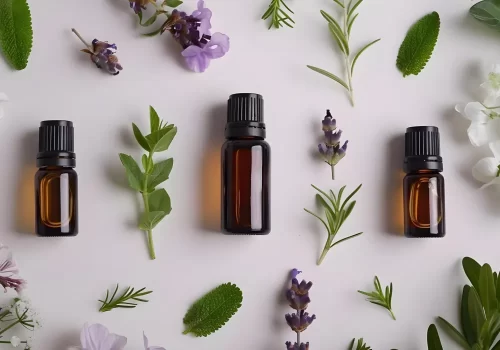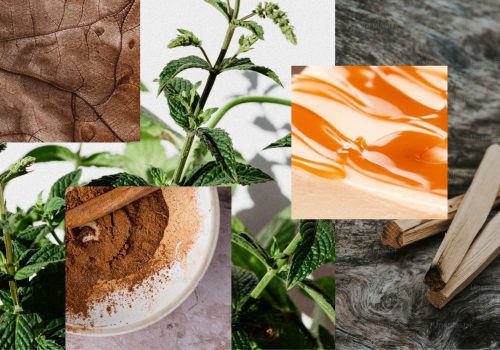Relaxing Diffuser Blends
Crafting Relaxing Diffuser Blends and Exploring Essential Oils for Relaxation
The aroma of gingerbread, tequila, and laundry detergent likely conjure three wildly different sets of memories in your brain. And there’s a good chance those memories are also associated with wildly different emotions.
Our sense of smell and our ability to process emotions are deeply linked. In fact, certain smells are scientifically proven to affect our moods and promote stress relief. So, if you’re looking for a fragrance oil to create a tranquil atmosphere in your home, an expertly crafted diffuser blend of feel-good essential oils just might do the trick.
What essential oils are good for relaxation specifically? Read on to learn more about different scents for relaxing and discover how essential oils work so that you can transform your home into a tranquil oasis.
How Do Scents Affect Your Mood?
If you’ve ever caught a whiff of something that took you back to a specific memory, you know just how intertwined scent and memory are in our brains.
Since the olfactory bulbs are part of the brain’s limbic system, they’re neurologically wired to take part in emotional processing and “associative learning” (i.e. associating a smell with a mood).
Odor learning begins even before birth — studies show that infants who were exposed to strong scents while in the womb (like garlic or cigarette smoke) prefer those scents over babies who were not exposed to them. This is why our odor and taste preferences are often established seemingly at birth.
This is also why it’s difficult to find scents that are unanimously liked or hated, and why using “stink bombs” in military combat is deceptively difficult. One study found that most British people hated the scent of wintergreen, as their culture associated it with medicine, while Americans loved the smell and associated it with candy.
The human brain loves a positive, familiar smell, and evolved to recognize the pleasant smells in nature that are associated with non-toxic food. So, while it’s tough to find scents that are universally beloved, ones found in nature or associated with food are the best contenders.
5 Scents to Help You Relax
The scents that are nearly universally calming to the human brain are often those found in nature—those that even our ancestors knew meant a safe place to rest or a good meal. Below are some of those scents, which can also be found in Homedics SereneScent relaxing diffuser blends if you’re looking to promote relaxation at home.
1. Citrus (Maldives Escape)
Studies show that the scent of citrus (i.e. bergamot, lemon peel, sweet orange flowers) can have relaxing, mood-uplifting, and even “cheer-enhancing” effects.
On top of this, using citrus oil also helps reduce waste. Typically, 40-47% of each citrus fruit is discarded when it’s harvested or eaten (i.e. fruit peels, leaves, flowers), but the oil glands in these inedible parts of the plant can be used to extract those feel-good oils.
2. Rose (Parisian Affair)
There’s a reason why roses are one of the most popular bouquets to gift, and it’s not just because they’re pretty. The scent of rose oil (the essential oil extracted from rose petals) is actually proven to help promote relaxation and alleviate symptoms of anxiety and depression.
In one study, university students placed in a room where rose oil was diffused reported feeling “comfortable,” “relaxed,” and “natural,” thanks to rose oil’s effect on the brain’s prefrontal cortex.
3. Blonde Tobacco (Parisian Affair)
The scent of blonde tobacco leaves is nothing like that of cigarette smoke. Instead, it’s rich, warm, and lightly sweet. It’s also proven to have subtle calming effects.
In fact, studies show that diffusing tobacco essential oil can help alleviate symptoms of anxiety and even regulate your body’s stress response.
4. Eucalyptus (Maldives Escape)
It only makes sense that sweet, gentle koalas are known to munch on eucalyptus leaves. Studies show that eucalyptus essential oil promotes calm and focus, even while the brain bears the mental load of everyday tasks.
Studies also show that inhaling eucalyptus oil has anti-anxiety properties and decreases signs of stress in the body before, during, and after completing tasks or facing stressful situations.
5. Lavender (Amalfi Bliss)
Lavender essential oil, extracted from the petals of the pretty purple flower, is well-known for its calming properties — it’s why you’ll find it in so many sleep products like pillow sprays and before-bed face masks.
And those calming effects lavender has on the nervous system are backed by science — not only has lavender proven to induce relaxation and act as a sedative, but it’s also an effective mood stabilizer.
Diffuse to Your Heart’s Content with SereneScent
Many people want their home environment to instill calm and relaxation the second they walk through the door. What better way to naturally promote a healthy mood than by capitalizing on that scientific scent-mood connection? And Homedics makes it easy.
Homedics SereneScent diffuser blends all contain essential oils that can help promote calmness and tranquility. Plus, they pair perfectly with our waterless diffuser, which disperses fragrant microdroplets throughout your entire space, providing an effortless way to embrace the benefits of aromatherapy. Learn more about what aromatherapy is and how to use aromatherapy effectively for a soothing and enjoyable experience today.
Whether you want to feel like you’ve been transported to a beach getaway, a Parisian vacation, or another soothing destination entirely, our natural, plant-based scents are sure to deliver.
Sources:
Scientific American. Do scents affect people’s moods or work performance? https://www.scientificamerican.com/article/do-scents-affect-peoples/
Tufts University. Smell and Emotion. https://sites.tufts.edu/emotiononthebrain/2014/12/07/smell-and-emotion/
National Library of Medicine. Citrus Essential Oils in Aromatherapy: Therapeutic Effects and Mechanisms. https://www.ncbi.nlm.nih.gov/pmc/articles/PMC9774566/
National Library of Medicine. Therapeutic efficacy of rose oil: A comprehensive review of clinical evidence. https://www.ncbi.nlm.nih.gov/pmc/articles/PMC5511972/
National Library of Medicine. Anxiolytic Effect of Two Tobacco Essential Oils (Nicotiana tabacum Linn.) on Mice. https://www.ncbi.nlm.nih.gov/pmc/articles/PMC8306096/
National Library of Medicine. The effect of 1,8-cineole inhalation on preoperative anxiety: a randomized clinical trial. https://pubmed.ncbi.nlm.nih.gov/25028591/
National Library of Medicine. Lavender and the Nervous System. https://www.ncbi.nlm.nih.gov/pmc/articles/PMC3612440/





